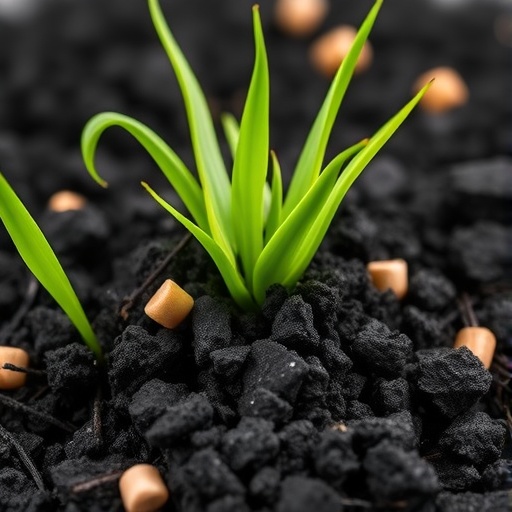In an innovative study that explores the intricate relationship between bacterial strains and biochar, researchers have delved into methods of inoculation that significantly boost the survival rates of various Bacillus species when applied to rice husk biochar. This research, led by Nakahara, Someya, and Maeda, emphasizes the burgeoning potential of biochar—an organic material derived from plant biomass, often utilized for enhancing soil quality—as a practical medium for microbial life. Specifically, the study aims to unlock ways to fortify bacterial carriers for agricultural applications that could contribute to more sustainable farming practices.
Biochar has emerged as a promising soil amendment due to its ability to retain moisture and nutrients while also enhancing soil microbial communities. The findings of this study suggest that integrating Bacillus strains with rice husk biochar could be a game changer in the effort to improve soil health and crop productivity. The authors propose that when certain inoculation methods are employed, the stability and resilience of beneficial bacteria in biochar can be markedly increased, thereby aiding their ability to colonize soil environments effectively.
Incorporating Bacillus strains into agricultural practices offers numerous advantages, including improved nutrient availability, enhanced plant growth, and increased resilience to pathogens. These microorganisms are known for their versatile metabolic capabilities that can promote plant health by decomposing organic materials, cycling nutrients, and suppressing harmful pathogens. However, their effectiveness can be challenged by environmental factors, making exploration into optimal survival techniques critical for maximizing their benefits in farming systems.
The inoculation methods explored in this research are multifaceted, employing a range of techniques designed to enhance both the immediate and long-term survival of Bacillus strains within the biochar matrix. One primary approach involves optimizing the conditions under which the bacteria thrive, including adjustments to moisture content, temperature, and nutrient availability. These factors can significantly affect how well the bacteria establish themselves in the biochar and their subsequent effectiveness once introduced into the soil ecosystem.
The study also considers the importance of the physical and chemical properties of biochar itself. The surface area, porosity, and charge of the biochar play pivotal roles in modulating how well these beneficial bacteria can adhere and survive. Biochar can provide a well-structured habitat that not only protects the bacteria from environmental stressors but also facilitates nutrient exchange, thus promoting bacterial longevity upon application to soil.
Field trials conducted as part of the research demonstrate the practical applicability of these findings. Through strategic application of the inoculation methods, researchers observed improved performance indicators in crops, such as increased germination rates and enhanced growth metrics when Bacillus-infused biochar was used. These promising results underscore the potential of this biotechnological approach as a natural alternative to chemical fertilizers, opening the door to innovative practices that could lead to more sustainable agriculture.
Moreover, the implications of this research extend beyond agriculture. As climate change and environmental degradation continue to challenge modern farming, biotechnological interventions like this one could play a crucial role in developing resilient agricultural systems. The principles of utilizing beneficial microbes in conjunction with biochar could be applied across various ecosystems to enhance soil health, restore degraded lands, and promote biodiversity, which is vital for ecological stability.
The study contributes to a greater understanding of microbial ecology within agroecosystems and highlights the necessity for more nuanced approaches in agricultural biotechnology. As researchers continue to explore the myriad interactions within soil health frameworks, findings such as those presented in this work pave the way for future innovations aimed at addressing global food security through sustainable practices.
Researchers encourage continued exploration into various plant-associated microorganisms and their interactions with biochar to uncover additional synergies that could yield further benefits. The ongoing research in this area could fundamentally shift the way we approach agricultural inputs and their impacts on crop yields, soil health, and overall ecosystem functionality.
In conclusion, as we advance our methodologies for employing microorganisms in agriculture, the collaboration between researchers, agricultural producers, and policymakers will be essential. This collaborative effort will ensure that scientific insights from studies such as this one translate effectively into practical solutions for the agricultural sector, contributing to a more resilient food production system that meets the demands of a growing global population.
The study brilliantly encapsulates the evolving interplay between microbial life and innovative agricultural practices, showcasing how a seemingly simple material, such as rice husk biochar, can serve as a foundation for transformative changes in how we think about soil health and crop productivity. The future of sustainable agriculture may very well depend on these continual evolutions in our understanding of microbial technologies, as science and nature work hand in hand towards a sustainable tomorrow.
Subject of Research: Inoculation methods enhancing the survival of Bacillus strains in rice husk biochar.
Article Title: Inoculation methods that enhance the survival of Bacillus strains in rice husk biochar for use as bacterial carriers.
Article References:
Nakahara, H., Someya, N., Maeda, Y. et al. Inoculation methods that enhance the survival of Bacillus strains in rice husk biochar for use as bacterial carriers.
Int Microbiol (2025). https://doi.org/10.1007/s10123-025-00737-5
Image Credits: AI Generated
DOI: https://doi.org/10.1007/s10123-025-00737-5
Keywords: Bacillus, biochar, inoculation methods, sustainable agriculture, crop productivity.




